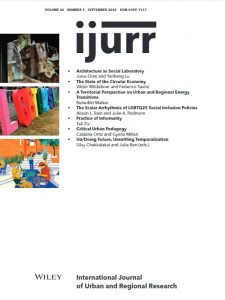LGBTQ2S municipal governance is a contentious policy domain that is often publicly framed as ‘morality’ or ‘niche’ politics, yet urban sexuality scholars have shown its fundamental dissonance and incommensurability across spatial scales. Within polycentric city-regions aspiring to ‘progressiveness’, LGBTQ2S-supportive municipal social inclusion policy is further subject to arrhythmic diffusion. In this article we introduce the neologism of scalar arrhythmia (a biomedical metaphor that parallels the pace of diffusion with the irregularities of a heartbeat) in conjunction with scale-contingent coalitional moments (spatiotemporal junctures that bring people together to enact social change) to advance an urban social justice agenda. We argue that the analytical vantage point of scalar arrhythmia reveals differences in the longitudinal temporal (a)synchronicities of peripheral municipal inclusion policy diffusion and locates transformative scale-contingent coalitional moments. Through an analysis of the interplay of diffusion processes and mechanisms across the adjacent peripheral municipalities of Burnaby, New Westminster and Surrey in Canada’s Vancouver city-region, we demonstrate provincial–municipal hierarchical ‘coercion’, core–periphery metropolitan relocation ‘imitation’ and municipal inter-peripheral contagious ‘competition’. While peripheral patterns of scalar arrhythmia rupture Vancouver’s illusive progressive regionalism, the concept offers civic leaders an inventorying opportunity that redirects attention away from cursory LGBTQ2S policy performances towards substantive policy integrations and local innovations.
Details
Written by:
Alison L. Bain & Julie A. Podmore
Digital Object Identifier (DOI)
https://doi.org/10.1111/1468-2427.13121
About DOI

